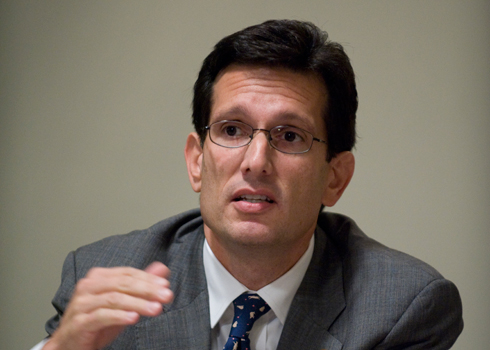Reacting to the news that rating agency Standard & Poors is downgrading its outlook for the U.S. economy based on political gridlock over cutting the deficit, House Majority Leader Eric Cantor (R-VA) claimed vindication for the GOP. According to Cantor, the report strengthens the Republicans’ argument for holding out on a debt limit increase unless they can get major cuts as part of the deal.
The White House — and the bulk of mainstream economists — have warned that a failure to increase the debt limit would lead to an economic catastrophe.
“Serious reforms are needed to ensure America’s fiscal health, and today S&P sent a wake-up call to those in Washington asking Congress to blindly increase the debt limit,” Cantor said in a statement. “Today’s announcement makes clear that the debt limit increase proposed by the Obama Administration must be accompanied by meaningful fiscal reforms that immediately reduce federal spending and stop our nation from digging itself further into debt. For decades, Washington has blindly increased the debt limit while doing little to stop spending money that it doesn’t have, a dangerous pattern that must end. As S&P made clear, getting spending and our deficit under control can no longer be put off for another day, which is why House Republicans will only move forward on the President’s request to increase the debt limit if it is accompanied by serious reforms that immediately reduce federal spending and end the culture of debt in Washington.”
Left unmentioned: the same news story Cantor sent to reporters on the S&P move notes that the last time the agency downgraded their outlook on US debt was 1996, out of fear that the GOP would block a debt ceiling vote.
Update: Rep. Peter Welch (D-VT) released a joint demand from 114 House Democrats that the House hold a “clean” debt limit vote and claimed the S&P rating bolstered their argument.
“America pays its bills,” Welch said in a statement. “I hope Majority Leader Cantor and those in Congress seizing upon debt ceiling pressure as a ‘leverage opportunity’ are listening to the markets today and thinking twice about their risky strategy.






